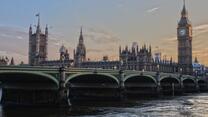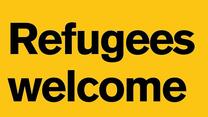When discussing people who have fled war and persecution, the words we use matter.
Refugees and asylum seekers have been forced to leave behind their homes, jobs, and families. While 70% of refugees live in countries that border their own, some feel they have no choice but to undertake journeys to reach the UK. Family ties, local languages, and professional connections can all influence why people seek to come here.
Yet, when they finally arrive, refugees often find themselves caught in a war of words, with dehumanising terms like 'illegal immigrants' or 'illegal migrants' used in politics and media.
What is irregular migration?
There is no universally accepted definition of irregular migration. However, it's often used to mean travelling from one country to another, outside of official rules and regulations. Many people are forced to take irregular (i.e. unofficial) routes to the UK - such as dangerous journeys across the Channel - because there are currently no safe routes available.
The Refugee Convention, which the UK helped to create, allows refugees to seek protection in any signatory country, through making an asylum claim. However, you can only make this asylum application once you are physically in the UK, and there is no visa to enter for this specific purpose. Nor are you allowed to enter on a different visa – like work or tourism – to claim this right. The result is that the only way to access your right to asylum is to enter the UK irregularly.
Importantly, recognising the challenges and limitations for refugees in flight to travel through official or regular routes, the Refugee Convention prohibits punishment for irregular entry for people in this situation.
This does not mean that they ‘disappear’. The Home Office’s former Commander leading the operational response to small boat crossings told parliament that “very close to all” people who arrive on small boats claim asylum. This means they will be documented by the Home Office, and they are required to provide evidence and be interviewed to have their case assessed. Three-quarters are subsequently found to need refugee protection.
New data released by the MIrreM project also recently found that the number of irregular migrants living in the UK and other large European countries has remained stable since 2008.
If there were more safe routes, refugees would have an alternative way to ask for protection in the UK, without having to risk their lives on irregular journeys.
This is why safe pathways to protection - also known as 'regular pathways' or 'safe routes' - are so important. They help people relocate from a place where they are at risk, to another country of relative safety, where they can begin to recover and rebuild their lives.
Read more about safe routes here.
Why the term 'illegal migration' is problematic
Using the term 'illegal' to describe people who have entered the UK through irregular routes is problematic for several reasons. First, no person should be defined as illegal simply for a journey they took to seek asylum. Describing people who have fled war and persecution as 'illegal' is dehumanising and portrays them as criminals and threats, encouraging punishment rather than humane policies.
Cecilia Malmström, former European Commissioner for Home Affairs, previously stated: "Let me be clear about my vocabulary too: illegal migrants do not exist. People may come to the EU and might be required to use irregular ways… but no human being is illegal."
Instead, using the term 'irregular migration' focuses on the structures that force people to take irregular routes, rather than labelling the individual. Most importantly, it recognises the fundamental humanity and rights of all people, regardless of the way they claimed asylum.
The United Nations General Assembly, International Organization for Migration, Council of Europe, and European Commission have all deemed the phrase 'illegal migration' unacceptable, recommending instead the term 'irregular.'
The reality of Channel crossings
Channel crossings in small boats are a form of irregular migration because they occur outside official entry points. However, it’s crucial to understand why people risk their lives making these dangerous journeys.
There are currently no safe routes to asylum. It is not possible to apply for any kind of visa that would allow someone permission to enter the UK to claim asylum, and it is not possible to claim asylum from outside the physical territory of the UK. The few existing safe pathways are extremely restricted by nationality and number, which means people from many countries are forced to make journeys across the Channel.
Afghans currently make up the largest community of people crossing the Channel, with more arriving via dangerous journeys than through government schemes, which are very limited. Without functioning safe routes to the UK, people will continue to risk their lives to reach safety. Creating new safe routes for asylum seekers would not only save lives, but also reduce the need for dangerous journeys.
Instead of using harmful and misleading labels like 'illegal migrants,' we should focus on creating safe routes for people seeking protection as well as addressing the root causes that drive people to make irregular journeys.
Read more about why some refugees may come to the UK.
What is the International Rescue Committee?
The International Rescue Committee (IRC) helps people affected by humanitarian crises to survive, recover and rebuild their lives. Founded in 1933 at the call of Albert Einstein, we now work in over 40 crisis-affected countries as well as communities throughout Europe and the Americas.
Helping refugees rebuild in the UK
In addition to helping those in crisis and conflict zones, the IRC also helps refugees in the UK, where we provide orientation programming and employment support to help people recover and start to rebuild their lives.



